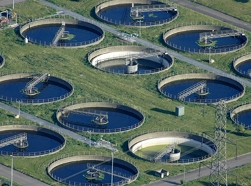
To reuse water requires capital that they would rather not spend if it's cheaper for them just to dispose of it. I think that's why we don't reuse that much. It might be more cost effective to figure out a way to reuse it than it would be not to.
The local government is providing $500,000 to help regional councils install solar-powered cameras and rain gauges before the 2012 wet season arrives.
Jeffrey Mousseau, currently a senior project manager for the lab's transuranic waste disposal program, is the new associate director for Environmental Programs.
Boehringer Ingelheim Vetmedica, Inc. has agreed to pay a $68,475 civil penalty and to spend at least $300,000 to build a state-of-the art hazardous waste storage facility.
The winners of the 2012 Solutions Exchange awards are Protei and Nonox Ltd.
The actions by the Commerce Department highlight continuing pressures on important fisheries and the economics depending on them.
The law enforcement agency said establishing National Environmental Security Task Forces is an effective way to fight environmental crime.
The Environment Agency and Waterwise urged businesses to reduce their water usage, saying UK businesses could save more than £3.5 billion a year by using water efficiency measures.
Since the start of summer, total assistance from the agency has amounted to nearly $28 million.
About 65,000 of them will be delivered this fall through a new partnership between the Curbside Value Partnership and city departments.
Using a new computational method, researchers at the Commerce Department agency found these have low global warming potential and boiling points low enough to be used in common refrigeration equipment.
Arsenic- and lead-contaminated soil is being cleaned up at several parks in two counties. A settlement has allowed the Department of Ecology to expand its Soil Safety Program to include parks, camps, and public multi-family housing.
Only a month after Hurricane Isaac swept past the city, the largest annual water quality conference will bring an estimated 18,000 attendees to the downtown Morial Convention Center.
The company announced it will stop drilling into deepwater zones for this year but will drill the top portions of as many wells as possible during the remaining season, then cap and temporarily abandon them.
Mike Matichich and colleagues looked at five thirsty industrial sectors, including oil & gas, chemicals, and semiconductors, to understand how water and wastewater costs are affecting business decisions.
The one-hour webinar on Sept. 18 is part of a series presented by CDC, the National Center for Environmental Health/Agency for Toxic Substances and Disease Registry, and the American Public Health Association.
Both are headquartered in Texas. R360 is a leading provider of non-hazardous oilfield waste treatment, recovery, and disposal services.
A total of 1,676 sites have been listed since 1983, and to date only 360 of those cleanups have been completed.
Included in the plan is the 2010 Clean Air-Clean Jobs Act, which is intended to set emissions controls, retire inefficient coal power plants, and convert certain electric generating units from coal to natural gas.
DEP Secretary Mike Krancer said the seminar series will inform local governments and businesses "about how they can take advantage of an abundant, clean-burning, and inexpensive fuel found right here in Pennsylvania" and "will help us develop our grant program moving forward."